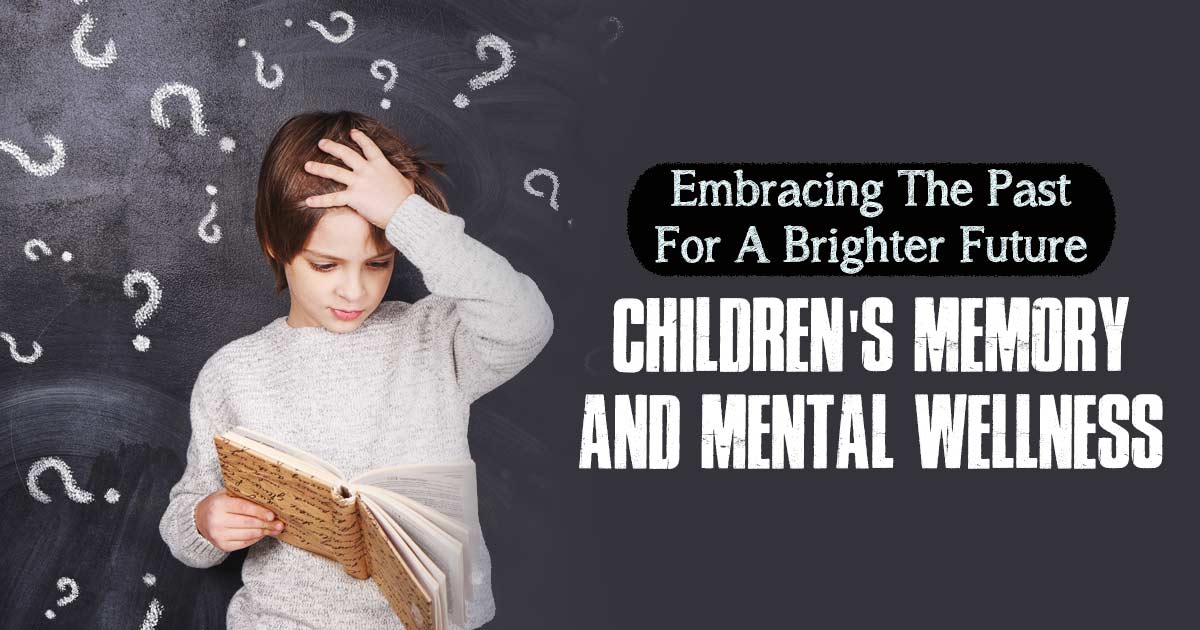The memories we create during our childhood play a profound role in shaping our lives. These formative years are critical for the development of cognitive, emotional, and social skills. However, the importance of caring for and boosting children’s memory and their impact on mental health often goes overlooked.
Memory Formation In Childhood
Before delving into the reasons for caring for children’s memory, it’s essential to understand how memory formation occurs during childhood. Memory formation is a complex process that involves three stages: encoding, storage, and retrieval.
In children, this process is particularly dynamic due to the rapid development of the brain, especially in regions associated with memory.
- Memory Encoding: During childhood, the brain is highly receptive to new information. Children are constantly absorbing knowledge and experiences from their environment. These experiences are encoded into their memory through synaptic connections in the brain.
- Memory Storage: Memories are stored in various regions of the brain, including the hippocampus and prefrontal cortex. The strength of these memory traces depends on the emotional significance of the experience, as well as its repetition and rehearsal.
- Memory Retrieval: Children retrieve memories when they encounter situations that trigger associations with past experiences. The ability to retrieve and integrate memories plays a vital role in their development.
The Impact Of Boosting Children’s Memory On Mental Health
Childhood memories can have a profound and lasting impact on mental health. The emotional and cognitive content of these memories can shape an individual’s self-perception, emotional regulation, and social interactions. Here are some ways in which childhood memories influence mental health:
- Emotional Regulation: Positive childhood memories can serve as emotional anchors, providing a sense of security and comfort. Conversely, traumatic or negative memories can lead to emotional dysregulation and contribute to conditions such as anxiety, depression, and post-traumatic stress disorder (PTSD).
- Self-Concept And Self-Esteem: Childhood memories contribute to the development of one’s self-concept and self-esteem. Positive memories of achievement and support can foster healthy self-esteem, while repeated negative experiences can lead to low self-worth and a negative self-image.
- Attachment And Relationships: Childhood memories also influence one’s ability to form and maintain healthy relationships. Early experiences with caregivers and peers can shape attachment patterns and affect interpersonal dynamics throughout life.
- Coping Mechanisms: The coping mechanisms individuals develop during childhood are often rooted in their early memories. Healthy coping strategies, such as problem-solving and emotional expression, can be learned through positive childhood experiences, while traumatic memories may lead to maladaptive coping mechanisms like avoidance or substance abuse.
Why We Should Care For Children’s Memory
Given the significant impact of childhood memories on mental health, it is imperative that we prioritize caring for and boosting children’s memory. Here are several compelling reasons why we should do so:
- Foundation For Healthy Development: Childhood memories provide the foundation for healthy cognitive, emotional, and social development. Nurturing positive memories helps children build resilience and adaptability in the face of life’s challenges.
- Prevention Of Mental Health Issues: By fostering a supportive and nurturing environment, we can help prevent the development of mental health issues that may stem from negative childhood memories. Early intervention and support can mitigate the long-term consequences of traumatic experiences.
- Empowerment And Resilience: Positive childhood memories can empower individuals with a strong sense of self-worth and resilience. These qualities enable them to navigate life’s ups and downs more effectively and seek help when needed.
- Long-Term Well-being: The mental health benefits of caring for children’s memories extend into adulthood and old age. A strong foundation of positive memories can provide emotional stability and a sense of purpose throughout one’s life.
- Social Impact: Individuals with a healthy mental state are more likely to contribute positively to their communities. By promoting children’s mental well-being through caring for their memories, we create a ripple effect of positive change in society.
Tips On How To Boost Children’s Memory
Caring for children’s memories requires a multi-faceted approach that involves parents, caregivers, educators, and society as a whole. Consider the following tips on how to boost children’s memory:
- Create a Nurturing Environment: Ensure that children grow up in a safe, supportive, and loving environment where their emotional needs are met.
- Encourage Positive Experiences: Foster opportunities for children to engage in positive, enriching experiences that build lasting memories, such as family outings, hobbies, and creative activities.
- Validate Emotions: Teach children to identify and express their emotions in a healthy manner. Validate their feelings and provide a safe space for emotional expression.
- Address Traumatic Experiences: If a child experiences trauma, seek professional help promptly to address the impact and prevent long-term negative effects.
- Promote Healthy Coping Strategies: Encourage children to develop healthy coping mechanisms, such as problem-solving, communication, and seeking support from trusted adults.
- Preserve Positive Memories: Document and celebrate achievements and milestones in a child’s life to create a reservoir of positive memories they can draw upon in difficult times.
Caring for and boosting children’s memory is not only a matter of nurturing their development but also a crucial investment in their mental health and well-being. The memories created during childhood play a significant role in shaping an individual’s emotional and cognitive landscape.
By fostering positive memories and addressing negative experiences, we can promote resilience, emotional well-being, and healthier outcomes for children, both in their formative years and throughout their lives. In doing so, we not only enhance the individual but also contribute to a more emotionally healthy and compassionate society.










